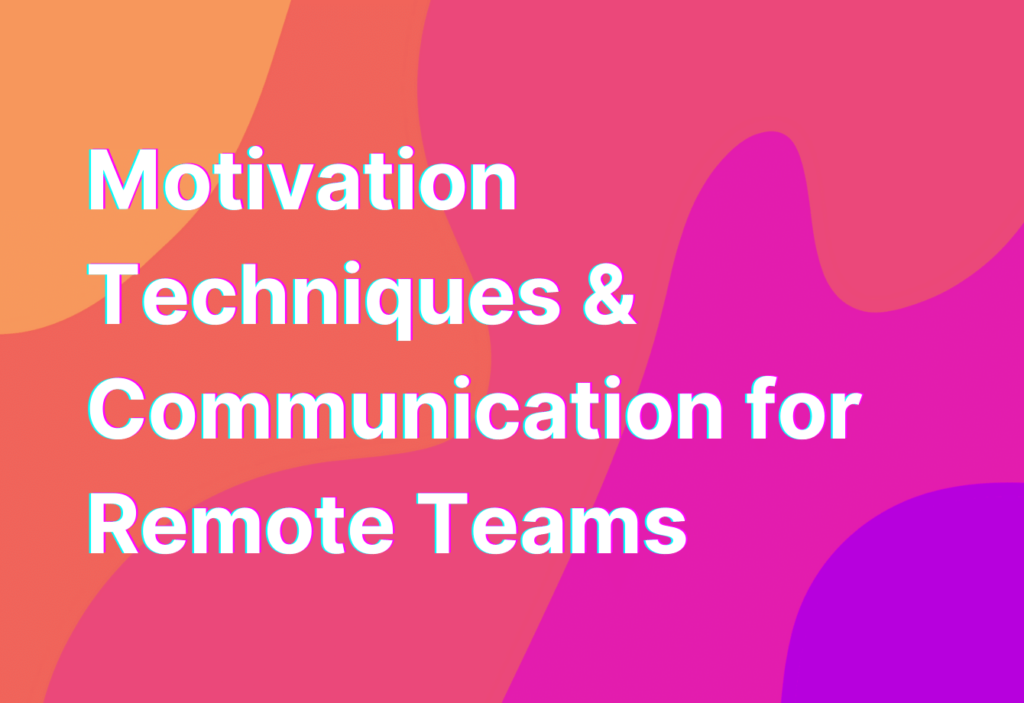Motivation Techniques & Communication for Remote Teams
Working remotely has become increasingly popular in recent years, and for good reason. It offers flexibility, eliminates commuting time, and allows for a better work-life balance. However, managing a remote team comes with its own set of challenges, particularly when it comes to motivation and communication. In this article, we will explore some effective techniques for keeping your remote team motivated and ensuring clear and efficient communication.
1. Set Clear Goals and Expectations
One of the most important aspects of motivating a remote team is setting clear goals and expectations. When team members know exactly what is expected of them, they are more likely to stay motivated and focused. Make sure to communicate these goals and expectations clearly and regularly, and provide feedback and guidance along the way.
For example, if you are using a project management tool like Trello, you can create boards for each team member with specific tasks and deadlines. This not only helps keep everyone organized, but also provides a visual representation of progress and accomplishments.
2. Foster a Positive and Supportive Team Culture
A positive and supportive team culture is essential for remote teams. Without the physical presence of a shared office space, it’s important to create a virtual environment where team members feel connected and supported.
Encourage open communication and collaboration by using tools like Slack or Microsoft Teams. These platforms allow for real-time messaging, video calls, and file sharing, making it easy for team members to connect and collaborate regardless of their location.
Additionally, consider implementing a recognition and rewards system to acknowledge and celebrate team members’ achievements. This can be as simple as a shout-out in a team meeting or a virtual “high-five” on a shared platform.
3. Provide Opportunities for Growth and Development
Remote team members, like any other employees, want to feel that they are growing and developing in their roles. Providing opportunities for growth and development not only keeps team members motivated, but also helps to retain top talent.
Offering online training courses, webinars, or workshops can be a great way to support professional development. Encourage team members to share their knowledge and expertise with others through virtual presentations or mentoring programs.
Additionally, consider providing opportunities for cross-functional collaboration or project rotations. This allows team members to expand their skill sets and gain new experiences, which can be highly motivating.
4. Foster a Healthy Work-Life Balance
One of the main advantages of remote work is the ability to achieve a better work-life balance. However, without clear boundaries, it can be easy for work to spill over into personal time, leading to burnout and decreased motivation.
Encourage your team members to set boundaries and establish a routine that works for them. This may include setting specific work hours, taking regular breaks, and creating a dedicated workspace.
Additionally, promote self-care and work-life balance by sharing resources and tips on topics such as mindfulness, stress management, and maintaining a healthy lifestyle. This shows that you value your team members’ well-being and helps to foster a positive and motivated remote team.
5. Regularly Check-In and Provide Feedback
Regular check-ins and feedback are crucial for remote teams. Without the ability to have face-to-face interactions on a daily basis, it’s important to schedule regular check-ins to discuss progress, address any challenges, and provide feedback.
Consider using video calls for these check-ins, as they allow for a more personal and interactive conversation. This helps to build rapport and trust among team members, which is essential for effective communication and motivation.
When providing feedback, be specific and constructive. Focus on both the positive aspects and areas for improvement, and offer guidance and support to help team members reach their full potential.
Wrapping Up
Motivating and effectively communicating with a remote team requires a proactive and intentional approach. By setting clear goals and expectations, fostering a positive team culture, providing opportunities for growth, promoting work-life balance, and regularly checking in and providing feedback, you can create a motivated and engaged remote team.
Remember, remote work offers many benefits, but it also presents unique challenges. By implementing these techniques, you can overcome these challenges and create a successful remote team.
For more tips and strategies on remote team management, check out our article on Negotiation Skills. Happy remote teaming!


